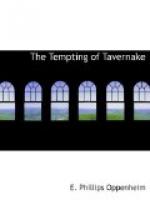“I am not ambitious for over-much work or for over-much money, Miss Nicholls,” Tavernake replied. “I will be frank with you both. Things out in the world there went ill with me; it was not my fault, but they went ill with me. What ambitions I had are finished—for the present, at any rate. I want to rest, I want to work with my hands, to grow my muscles again, to feel my strength, to believe that there is something effective in the world I can do. I have had a shock, a disappointment,—call it what you like.”
The old man Nicholls nodded deliberately.
“Well,” he pronounced, “it’s a big change to make. I never thought of help in the yard before. When there’s been more than I could do, I’ve just let it go. Come for a week on trial, Leonard Tavernake. If we are of any use to one another, we shall soon know of it.”
The girl, who had been looking out into the night, came back.
“You are making a mistake, Mr. Tavernake,” she said. “You are too young and strong to have finished your battle.”
He looked at her steadily and sighed. It was only too obvious that hers had been fought and lost.
“Perhaps,” he replied softly, “you are right. Perhaps it is only the rest I want. We shall see.”
CHAPTER II
THE SIMPLE LIFE
So Tavernake became a boat-builder. Summer passed into winter and this hamlet by the sea seemed, indeed, as though it might have been one of the forgotten spots upon the earth. Save for that handful of cottages, the two farmhouses a few hundred yards inland, and the deserted Hall half-hidden in its grove of pine trees, there was no dwelling-place nor any sign of human habitation for many miles. For eight hours a day Tavernake worked, mostly out of doors, in the little yard which hung over the beach. Sometimes he rested from his labors and looked seaward, looked around him as though rejoicing in that unbroken solitude, the emptiness of the gray ocean, the loneliness of the land behind. What things there were which lay back in the cells of his memory, no person there knew, for he spoke of his past to no one, not even to Ruth. He was a good workman, and he lived the simple life of those others without complaint or weariness. There was nothing in his manner to denote that he had been used to anything else. The village had accepted him without question. It was only Ruth who still, gravely but kindly enough, disapproved of his presence.
One day she came and sat with him as he smoked his after-dinner pipe, leaning against an overturned boat, with his eyes fixed upon that line of gray breakers.
“You spend a good deal of your time thinking, Mr. Tavernake,” she remarked quietly.
“Too much,” he admitted at once, “too much, Miss Nicholls. I should be better employed planing down that mast there.”
“You know that I did not mean that,” she said, reprovingly, “only sometimes you make me—shall I confess it?—almost angry with you.”




